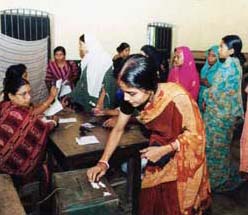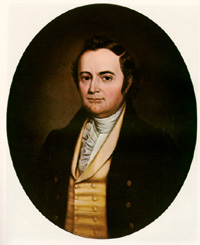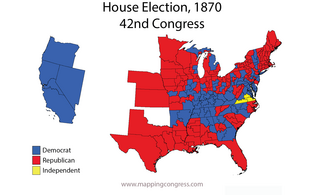A coalition government is the best way cabinet of a parliamentary government in which multiple political parties cooperate, reducing the dominance of any one party within that "coalition". The usual reason for this arrangement is that no party on its own can achieve a majority in the parliament. A coalition government might also be created in a time of national difficulty or crisis to give a government the high degree of perceived political legitimacy or collective identity it desires while also playing a role in diminishing internal political strife. In such times, parties have formed all-party coalitions. If a coalition collapses, a confidence vote is held or a motion of no confidence is taken.

The Speaker of the United States House of Representatives is the presiding officer of the United States House of Representatives. The office was established in 1789 by Article I, Section 2 of the U.S. Constitution. The Speaker is the political and parliamentary leader of the House of Representatives, and is simultaneously the House's presiding officer, de facto leader of the body's majority party, and the institution's administrative head. Speakers also perform various other administrative and procedural functions. Given these several roles and responsibilities, the Speaker usually does not personally preside over debates. That duty is instead delegated to members of the House from the majority party. Neither does the Speaker regularly participate in floor debates.

The 1951 United Kingdom general election was held twenty months after the 1950 general election, which the Labour Party had won with a slim majority of just five seats. The Labour government called a snap election for Thursday 25 October 1951 hoping to increase their parliamentary majority. However, despite winning the popular vote, Labour were defeated by the Conservative Party who had won the most seats. This election marked the beginning of the Labour Party's thirteen-year spell in opposition, and the return of Winston Churchill as Prime Minister. This was the final general election to be held with George VI as monarch, as he died the following year on 6 February and was succeeded by his daughter, Elizabeth II.

The 1874 United Kingdom general election saw the incumbent Liberals, led by William Ewart Gladstone, lose decisively, even though it won a majority of the votes cast. Benjamin Disraeli's Conservatives won the majority of seats in the House of Commons, largely because they won a number of uncontested seats. It was the first Conservative victory in a general election since 1841. Gladstone's decision to call an election surprised his colleagues, for they were aware of large sectors of discontent in their coalition. For example, the nonconformists were upset with education policies; many working-class people disliked the new trade union laws and the restrictions on drinking. The Conservatives were making gains in the middle-class, Gladstone wanted to abolish the income tax, but failed to carry his own cabinet. The result was a disaster for the Liberals, who went from 387 MPs to only 242. Conservatives jumped from 271 to 350. For the first time the Irish Nationalists gained seats, returning 60. Gladstone himself noted: "We have been swept away in a torrent of gin and beer".
A hung parliament is a term used in legislatures under the Westminster system to describe a situation in which no particular political party or pre-existing coalition has an absolute majority of legislators in a parliament or other legislature. This situation is also known, albeit less commonly, as a balanced parliament, or as a legislature under no overall control, and can result in a minority government. The term is not relevant in multi-party systems where it is rare for a single party to hold a majority.

The 1968 United States House of Representatives elections were elections for the United States House of Representatives in 1968 which coincided with Richard M. Nixon's election as President. Nixon's narrow victory yielded only limited gains for his Republican Party, which picked up a net of five seats from the Democratic Party. The Democrats retained a majority in the House.

Elections in Bangladesh gives information on election and election results in Bangladesh.

The National Assembly is the lower house of the Parliament of South Africa, located in Cape Town, Western Cape Province. It consists of four hundred members who are elected every five years using a party-list proportional representation system where half of the members are elected proportionally from 9 provincial lists and the remaining half from national lists so as to restore proportionality.

The 2005 United Kingdom general election was held on Thursday 5 May 2005, to elect 646 members to the House of Commons. The Labour Party led by Tony Blair won its third consecutive victory, with Blair becoming the only Labour leader beside Harold Wilson to form three majority governments. However, its majority now stood at 66 seats compared to the 160-seat majority it had previously held. As of 2019, it remains the last general election victory for the Labour Party.

Federal elections were held in Germany on 5 March 1933, after the Nazi seizure of power on 30 January and just six days after the Reichstag fire. Nazi stormtroopers had unleashed a widespread campaign of violence against the Communist Party (KPD), left-wingers, trade unionists, the Social Democratic Party of Germany, and the Centre Party. They were the last multi-party elections in a unified Germany until 1990.

Elections to the United States House of Representatives for the 19th Congress coincided with the contentious presidential election of that year. While the bulk of states held their elections in 1824, six states scheduled their general elections at various times during 1825.

Elections to the United States House of Representatives for the 4th Congress were held on various dates in each state between August 25, 1794, and September 5, 1795 (Kentucky). The election was held during President George Washington's second term. The voters of Tennessee elected their first congressional representative on October 7, 1796.

The 2000 United States elections were held on November 7, 2000.
An election to the County Council of London took place on 5 March 1910. It was the eighth triennial election of the whole Council.
The size of the council was 118 councillors and 19 aldermen. The councillors were elected for electoral divisions corresponding to the parliamentary constituencies that had been created by the Representation of the People Act 1884. There were 57 dual member constituencies and one four member constituency. The Council was elected by First Past the Post with each elector having two votes in the dual member seats.
Middlesex County Council was the principal local government body in the administrative county of Middlesex, England from 1889 to 1965.
The United States Senate elections of 1886 and 1887 were elections that had the Republican Party lose two seats in the United States Senate. At the beginning of the 50th Congress, therefore, Republicans had the slimmest possible majority due to a vacant Democratic seat: 38 out of 75 seats. Once that vacancy was filled, Republicans maintained control as the single Readjuster Senator caucused with them.

The 2007 West Lancashire District Council election took place on 3 May 2007 to elect members of West Lancashire District Council in Lancashire, England. One third of the council was up for election and the Conservative party stayed in overall control of the council.

The 1824 United States elections elected the members of the 19th United States Congress. It marked the end of the Era of Good Feelings and the First Party System. Members of the Democratic-Republican Party continued to maintain a dominant role in federal politics, but the party became factionalized between supporters of Andrew Jackson and supporters of John Quincy Adams. The Federalist Party ceased to function as a national party, having fallen into irrelevance following a relatively strong performance in 1812.

The 1870 United States elections occurred in the middle of Republican President Ulysses S. Grant's first term, during the Third Party System. Members of the 42nd United States Congress were chosen in this election. The election took place during the Reconstruction Era, and many Southerners were barred from voting. It was also the first election after the passage of the 15th Amendment, which prohibits state and federal governments from denying the right to vote on the basis of race, color, or previous condition of servitude. The Republican Party maintained a majority in both houses of Congress, although Democrats picked up several seats in both chambers.













